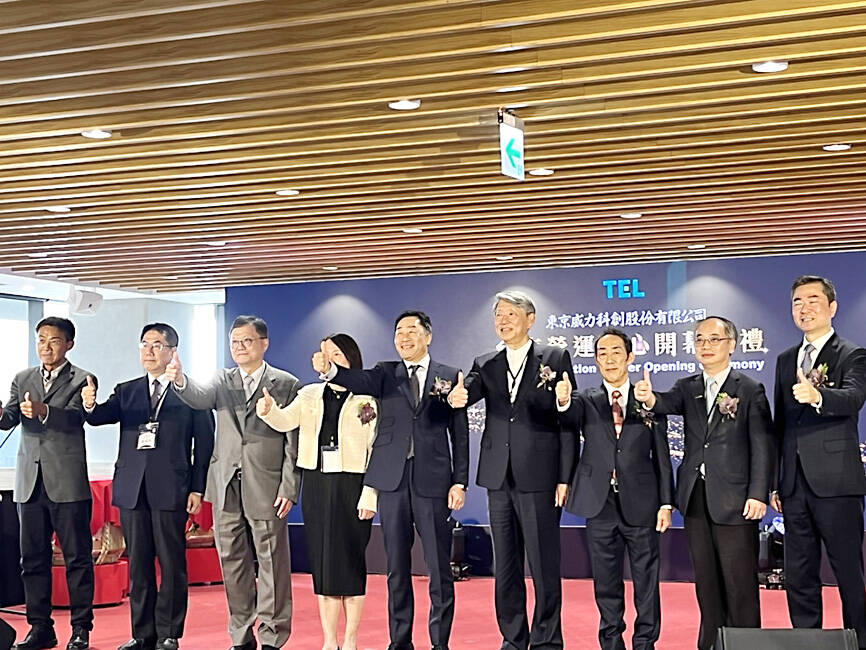Tokyo Electron Ltd, Asia’s biggest semiconductor equipment supplier, yesterday launched a NT$2 billion (US$61.5 million) operations center in Tainan as it aims to expand capacity and meet growing demand.
Its new Taiwan Operations Center is expected to help customers release their products faster, boost production efficiency and shorten equipment repair time in a cost-effective way, the company said.
The center is about a five-minute drive from the factories of its major customers such as Taiwan Semiconductor Manufacturing Co’s (TSMC, 台積電) advanced 3-nanometer and 2-nanometer fabs.

Photo: Grace Hung, Taipei Times
The operations center would have about 1,000 employees when it is fully utilized, the company said.
TSMC vice president T.S. Chang (張宗生), who oversees advanced technology and mask engineering, attended the center’s opening ceremony, along with United Microelectronics Co (聯電) and Winbond Electronics Corp (華邦電) representatives.
“With the opening of this operations center, we aim to reach two goals: First, we aim to expand our scale to cope with the ongoing growth of the Taiwanese market. Second, we hope to shorten the product repairing time cycle and to broaden the supply chain,” Tokyo Electron Taiwan Ltd chairman Hikaru Ito said at the ceremony.
The six-floor facility is comprised of a repair center and a testing lab to provide customers with one-stop services, as Taiwan plays a key role in the global artificial intelligence (AI) industry, Tokyo Electron Taiwan president Roger Chang (張天豪) said.
For the first time, the company can help fix vacuum transpiration robotic arms used in semiconductor equipment for customers in Taiwan, it said.
In the past, it took about seven months to complete the whole repair process in Japan, compared with one to two months now, it said.
The new repair center would also help customers fix damaged ovens used in lithography equipment, it said.
The company is mulling to build a more resilient supply chain in Taiwan through sourcing key parts locally, it said, adding that it has a shortlist of potential suppliers.
Taiwan has become the fourth-biggest market for the company, accounting for 13.3 percent of its total revenue in the second quarter, a spike from 9.3 percent a year earlier, a company financial statement showed.
The new operations center demonstrates the close partnership between Taiwan and Japan in the semiconductor field, Minister of Economic Affairs J.W. Kuo (郭智輝) said at the opening ceremony.

SEEKING CLARITY: Washington should not adopt measures that create uncertainties for ‘existing semiconductor investments,’ TSMC said referring to its US$165 billion in the US Taiwan Semiconductor Manufacturing Co (TSMC, 台積電) told the US that any future tariffs on Taiwanese semiconductors could reduce demand for chips and derail its pledge to increase its investment in Arizona. “New import restrictions could jeopardize current US leadership in the competitive technology industry and create uncertainties for many committed semiconductor capital projects in the US, including TSMC Arizona’s significant investment plan in Phoenix,” the chipmaker wrote in a letter to the US Department of Commerce. TSMC issued the warning in response to a solicitation for comments by the department on a possible tariff on semiconductor imports by US President Donald Trump’s

The government has launched a three-pronged strategy to attract local and international talent, aiming to position Taiwan as a new global hub following Nvidia Corp’s announcement that it has chosen Taipei as the site of its Taiwan headquarters. Nvidia cofounder and CEO Jensen Huang (黃仁勳) on Monday last week announced during his keynote speech at the Computex trade show in Taipei that the Nvidia Constellation, the company’s planned Taiwan headquarters, would be located in the Beitou-Shilin Technology Park (北投士林科技園區) in Taipei. Huang’s decision to establish a base in Taiwan is “primarily due to Taiwan’s talent pool and its strength in the semiconductor

Industrial production expanded 22.31 percent annually last month to 107.51, as increases in demand for high-performance computing (HPC) and artificial intelligence (AI) applications drove demand for locally-made chips and components. The manufacturing production index climbed 23.68 percent year-on-year to 108.37, marking the 14th consecutive month of increase, the Ministry of Economic Affairs said. In the first four months of this year, industrial and manufacturing production indices expanded 14.31 percent and 15.22 percent year-on-year, ministry data showed. The growth momentum is to extend into this month, with the manufacturing production index expected to rise between 11 percent and 15.1 percent annually, Department of Statistics

An earnings report from semiconductor giant and artificial intelligence (AI) bellwether Nvidia Corp takes center stage for Wall Street this week, as stocks hit a speed bump of worries over US federal deficits driving up Treasury yields. US equities pulled back last week after a torrid rally, as investors turned their attention to tax and spending legislation poised to swell the US government’s US$36 trillion in debt. Long-dated US Treasury yields rose amid the fiscal worries, with the 30-year yield topping 5 percent and hitting its highest level since late 2023. Stocks were dealt another blow on Friday when US President Donald